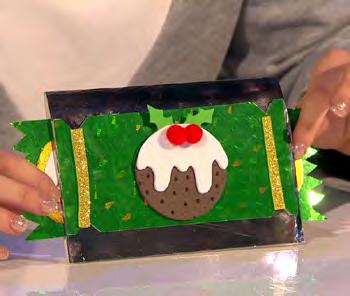
5 minute read
Great Families® Toy
Christmas Eve Traditions Mix and match ideas for different parts of the day and create family traditions that your children will treasure.
Morning
Advertisement
Posh breakfast. Enjoy pancakes and bacon using festive plates and cups. Feed the birds. Hang edible treats or a feeder so the birds can have Christmas dinner! Make reindeer food. Mix edible glitter and oats to sprinkle outside for Rudolph and friends.
Write a thank you letter to
Santa. Encourage your kids to leave thank you notes for Santa.
Create a Santa sack for others.
Get your children to select unwanted toys for Santa to pick up and take to other children.
Afternoon Bake something Christmassy.
Gingerbread, shortbread, cookies or a cake. Exercise. A family walk or cycle will help your children settle to sleep on the big night. Set up a treasure hunt. Leave clues around the house for kids to find a special Christmas Eve present like a tree decoration. Family photoshoot. Take a family selfie. Compare with Christmas photos from previous years. Play a game. Introduce a new card game or play a board game.
Evening
Snuggle up and watch a film, read a Christmas story or watch a panto. Leave food out for Santa. Don’t forget a carrot for Rudolph!
Enjoy virtual Christmas carols.
This year many organisations will be having carolling events online.
Go on a family Christmas light
walk. Get some fresh air and check out the neighbourhood Christmas lights. Carol singing. Wrap up warm and treat neighbours and friends to your angelic voices – at a safe distance!
Hang up the stockings.
Remember the most important tradition of all (as if you’d forget)!
Songs can help children learn and remember. Check out these great singalongs for under 5s.
Days of the Week Song Learn the days of the week with Buzz the Bandleader.

Counting to Ten in Four Languages There’s English, German, Portuguese and Indonesian.


The Wheels on the Bus Great for co-ordination and includes signing.
Shapes Song Shape up with The Hippie Hippie Shapes in the CBeebies house.

Alphabet Song Bring the alphabet to life with this memorable song and movement routine.


Months of the Year Learn the months by singing along with Marvie from Sesame Street.
Head, Shoulders, Knees and Toes Teaches co-ordination and body parts.


12 Days of Christmas
Sing and count with this popular Christmas song.
So Many Colours to See
Learn about colours with The Wiggles.

Baby Love Matters

Dr Owen phD MSc BSc has over 30 years’ experience working with parents and babies as a registered nurse, midwife, specialist community public health nurse, and researching mental health in postnatal mothers. She provides in-home therapeutic support for parents and babies, from the antenatal period up to two years of age.
Consultations can help with... • Managing anxious feelings and overwhelming thoughts around the health and wellbeing of your baby. • Understanding why babies behave the way they do, what they are communicating to you and how to respond. • Coping mechanisms for regular or prolonged periods of crying, diffi culty in soothing, night time waking, feeding issues, and generally seeming unpredictable.
Get in touch to arrange a consultation.
FAMILY LIFE
The Importance of Toddler Play
By Dr Sarah Mundy Play is an enjoyable part of childhood, and an important one for the developing brain. Through play, children develop physically, emotionally, cognitively and creatively. It allows them to engage in the world in a way that feels safe, explore different roles, address fears, and develop confidence.

Children who have parents who actively play with them, learn about sharing, problem solving and decision-making more quickly than those who don’t. Playing with your child also helps you understand their world and shows them you are interested in them, both important aspects of a secure attachment relationship, which is seen as the cornerstone of a child’s development.
So playing with our children is very important, even though prioritising this can be difficult. But how do we initiate play? And what do we do?
READ MORE
Unlock Your Child’s Inner Superpowers
Children’s charity Barnardo’s has launched the Super Seekers activity packs for children aimed at helping to develop life skills such as kindness, creativity and resilience. The packs are designed to help children ages 3 to 5 years develop important life skills through fun and imaginative play.
FIND PACKS


Top tips for staying ‘present’
this Christmas By Emma Grant

Stay calm and carry on with your routine
Children need to know what to expect, when, where and why more than ever at Christmas. Work things around your child’s regular routine, not around anything else or guests. Sticking to regular bedtimes and mealtimes, while offering plenty of warnings and reminders of what’s to come, is vital.
Be Organised
Plan and be organised yourself. Make a list of what you’re buying family and friends, then wrap gifts straight away, keeping a note of what you bought for whom and how much it cost.
Spread the Joy
Spread the celebrations and presents over a few days rather than in one go. Surprising them with gifts on Christmas Eve, Christmas Day and Boxing Day will prevent overwhelm and fatigue and prolong the joy, anticipation and appreciation.
Manage Expectations
Expect some tears and tantrums. Be proactive in pre-empting your child’s moods and emotions and help other family members do the same. Let them know your child may act childish and to just ignore any carrot flinging episodes or melt downs at bedtime, to prevent undue attention.
Stay Present
To remain calm amid the chaos, stay present — it’s the gift that keeps on giving. Christmas is a memorymaking moment, so make Christmas memories your child will cherish, and enjoy this time yourself. Build that Lego castle, watch that family movie together and stay in each and every moment.

Emma Grant is the author of The Confident Parent’s Guide to Raising a Happy, Healthy & Successful Child and The Powerful Proactive Parent’s Guide to Present Parenting. Emma is also a Hypnotherapist, Nutritional Therapist and Parenting Coach/Counsellor. She works alongside her husband at Happy Childcare, living in Cardiff with their teenage children. She also writes a weekly blog.





